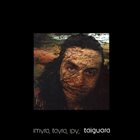

Contextualization is necessary: in the late sixties, Taiguara was seen as one of the biggest names in Brazilian popular music. He have won festivals, their albums sold well, their songs were reproduced constantly in the radios. Over time, Taiguara was fond of singing more freely, allowing himself to make small comments about the military dictatorship and the dreams of a new society - all in metaphors and innuendos. In 1971, in the album "Carne e Osso", there was a song dedicated to Cuba. The Brazilian censorship never left Taiguara rest for then on. In the following years, more than 60 songs would be prohibited, censored, or prevented from being reproduced in radio and concerts. His shows were constantly attacked by police forces. Taiguara decided to go on exile. In England, he records an album with Michel Legrand and the London Symphonic Orchestra. The album is banned from being released in England by the Brazilian government - today the original tapes have not yet been found. In 1975 he was allowed to return to Brazil and record a new album.
How? How to express his indigenous roots, his displeasure with censorship and dictatorship and his dream for another society without censorship attacking him? "Imyra, Tayra Ipy" is born.
With Wagner Tiso, Hermeto Pascoal and more than 80 musicians, "Imyra, Tayra Ipy" becomes a lavish album, absurdly complex, with thematic and concept from start to finish. The arrival in Brazil, his feeling of belonging to a land whose birds do not sing anymore; its indigenous, African and Spanish roots sung, while more than 3 musicians solo at the same time. "Imyra, Tayra Ipy" is a landmark of both the artist and Brazilian music. Albums like this were not usually recorded in Brazil: by technical and financial condition to gather all the attributes. "Imyra, Tayra Ipy" grandeur comes, often in the album, in its ability to completely subvert brazilian songs and themes in something completly different. One of the best example is his reading of "Aquarela do Brasil" in the track "Aquarela de um país na lua".
The result? Three days later, the Brazilian police collected the album form the shelves of the stores and destroyed the copies. Taiguara went into exile in Europe and Africa and would record again only almost ten years later.
But no matter, the song has come to us, we have the opportunity to see an artist who used the music to take revenge on a system, whith strings, drums and highly dreamy lyrics.
The Taiguara of the following decades would be extremely bold and would definitely drop the metaphors to reach his political ideas in a direct form.